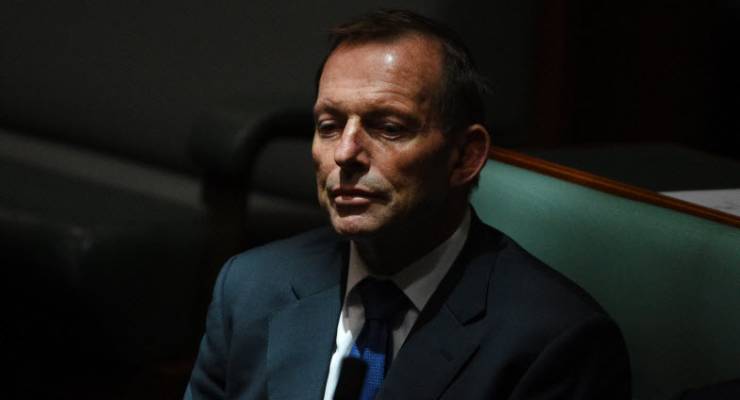
“I probably feel a bit threatened, as so many people do. It’s a fact of life.”
— Tony Abbott, 2010
Former Prime Minister Tony Abbott is committed to the destruction of the man who replaced him, and is willing to use any issue (and adopt any position, no matter how hypocritical) to do it. But it’s also worth reflecting on his psychology and that of men (they’re mostly men) like him, given they are likely to play a continuing role in parliament until the Liberal and National parties decide to enter the 21st century and start resembling contemporary Australia a little more closely.
The psychological basis for climate change denial has attracted increasing academic study in recent years, as researchers try to work out why one particular demographic — older white males — tends to dominate the ranks of climate denialists (compare, say, vaccination denialism, which has a younger and more female demographic). A 2015 study that has drawn considerable attention identified that “denial is driven partly by dominant personality and low empathy, and partly by motivation to justify and promote existing social and human-nature hierarchies.” That is, climate denialists were partly motivated by concern that climate action would undermine existing hierarchies, which, as white males, they tended to dominate. And because they see the world in terms of hierarchies, the only alternative they can conceive of is a hierarchy in which they are not dominant.
As it turns out, this kind of fear — that one is being threatened with losing one’s dominant status — is applicable across a range of issues. While he later said he chose his words poorly, Abbott saying that he felt “threatened” by homosexuality accurately conveyed a similar sentiment: he sees LGBTI people as threatening — not, of course, to his physical self, but to his social status. He put it even better when he explained his “threatened” comments by saying homosexuality “challenges orthodox notions of the right order of things”, revealing how LGBTI people conflicted with his hierarchical, “right order” view of the world.
This deep-seated, hierarchy-based fear can also be seen in Abbott’s monarchism; he described any push for a republic as “the latest instalment in the green-left’s war on our way of life”. It even explains his bizarre claim, while Prime Minister, that he was a kind of fiscal fire brigade and the mere fact that he was in office was enough to address the fiscal emergency, just like the arrival of the fire brigade at a fire showed that everything was under control. This peculiar image only makes sense if you see the world as a hierarchy in which the restoration of the right people to the top of the hierarchy ensures all is well, no matter what action they might take, or even if they take no action at all.
Much has always been made of Abbott’s Catholicism, but it’s hard to see religion as playing a particular role in this worldview; Catholicism is no more hierarchical than Anglicanism, for example, or some other Christian sects. But through a prism of hierarchy, it becomes easier to understand why Abbott clings to the heterosexual, coal-fired, monarchical Australia he believes he grew up in, because that delivered him, as he sees it, to the top of the “right order of things” and anything that contradicts it must be fought as a kind of existential threat.
This is a key reason why Abbott is so adept at exploiting the politics of fear. All politicians traffic in fear, of course, but Abbott’s time in public life has been defined by it because his unparalleled genius has been to tear down or halt the achievements of others. From the republic to a carbon price and terrorism to, now, coal and marriage equality, Abbott uses fear and the belief that we are under threat to prevent change to the “right order of things”. He’s able to do so because he knows fear so well, because it’s not an artifice for him, but something he feels at the very core of his being. It’s a frightening world for Tony Abbott, and he wants you to be frightened, too.








Crikey is committed to hosting lively discussions. Help us keep the conversation useful, interesting and welcoming. We aim to publish comments quickly in the interest of promoting robust conversation, but we’re a small team and we deploy filters to protect against legal risk. Occasionally your comment may be held up while we review, but we’re working as fast as we can to keep the conversation rolling.
The Crikey comment section is members-only content. Please subscribe to leave a comment.
The Crikey comment section is members-only content. Please login to leave a comment.